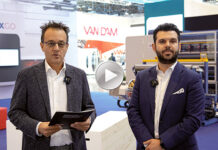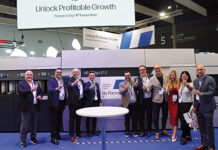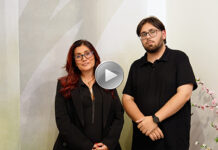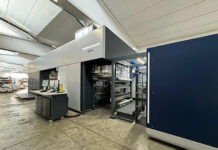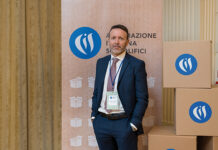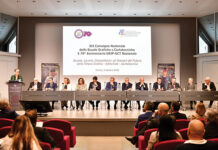Pioneering, inspiring and environment-friendly innovations in the corrugated sector were celebrated with prestigious awards on October 27 at the end of the three-day Technical Seminar in Lyon of FEFCO, the European Federation of Corrugated Board Manufacturers.
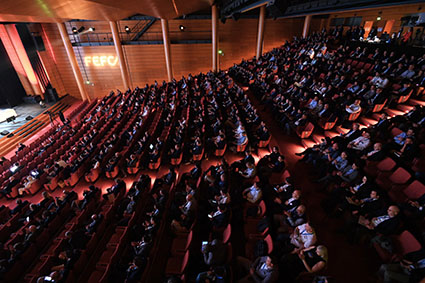
The most prestigious prize was for Best Innovation, and this year the Gold Award went to Kyoto Group for their proven method in the electrification of process-heat from renewable sources like wind and solar energy via a thermal energy storage solution. Speaker Lars Martinussen explained how the technology could help the corrugated industry become less dependent on the volatility in their energy costs and supply.
The Silver Award was attributed to JB Machinery, and their Auto Dryer Control (ADC), a system to cut energy consumption on infrared (IR) dryers by automatically taking control on the dryer settings. As speaker Dave Burgess explained, this uses a closed loop algorithm to find an optimal drying level, reducing electricity costs on flexo printing units.
The Bronze Award was won by Graco Distribution BV, for their work on the replacement of hydraulic pumps with electric double diaphragm pumps. Speaker Gaetan David said this could drastically reduce the corrugated industry’s energy costs and CO2 emissions.
The Sustainability Award went to Kyoto Group and the Best Presentation Award, out of some 65 spotlights delivered during the Lyon seminar, was given to Bart Verbruggen from OMP NV, who was recognised for his excellent speech on “planning for sustainability”, or green planning which is offering a practical solution to the sustainability challenges in the corrugated supply chains.
The Most Inspiring New Member Award went to the Netherlands-based C-TECH, whose Patrick Borgions outlined innovations in automation for multipoint folder gluers, including pre-feeding, bundling and palletising of all types of boxes.
There were also two Lifetime Achievement Awards: for Yves Bletterie from Bobst and for Mauro Adami from Fosber, who felt immensely proud of the recognition.
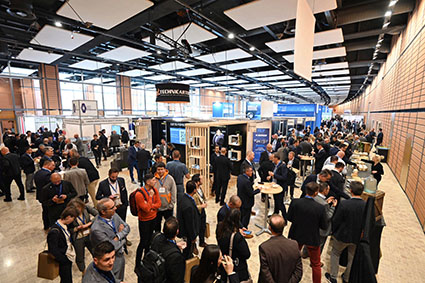
Corrugated packaging gets smarter and greener
Some 1,150 representatives from the corrugated board industry and its suppliers heard about the latest innovations and process optimisation at the FEFCO Technical Seminar in Lyon on October 25-27, where ideas, policies and new technologies in the sector were debated.
Sustainability improvements, optimised energy consumption, production of lighter and stronger board systems and other smart technologies were showcased at Lyon’s Centre de Congrès which this year had the headline, “Shaping our future through innovations”.
This event brought together dynamic representatives of the corrugated sector, suppliers, customers, and industry visionaries to debate how intelligence and digitalisation can transform manufacturing processes, enhance supply chain management, and drive overall efficiency. The conference included specific sessions on energy efficiency and energy reduction, light paper grammages, artificial intelligence (AI), digital printing, logistics flows, bio-based coatings, cybersecurity, and EU legislation.
On the exhibition floor, 165 stands and 110 exhibitors from 41 countries showed off their products and services. The 2023 event set an attendance record and all numbers are up from the previous FEFCO events in Copenhagen (2021) and Geneva (2019).
The FEFCO Technical Seminar kicked off after a key European Parliament Environment Committee vote on the EU’s proposed Packaging and Packaging Waste Regulation (PPWR), which aims to reduce packaging waste across the entire economy.
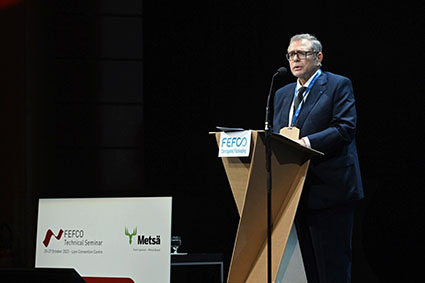
FEFCO President, Fady Gemayel said the corrugated industry was already in line with the EU’s Green Deal objectives. “Our product has proven to be essential to the well-being of the economy and for society. It has demonstrated its unique role in the distribution value chain. Corrugated cardboard is recyclable and recycled” he said. “Let us not forget that our boxes, once used, are recovered, repulped, and made into paper and then into a new box. This is real circularity. Corrugated boxes are using the same fibre repeatedly, as 89% of paper packaging is made from recovered paper.”





